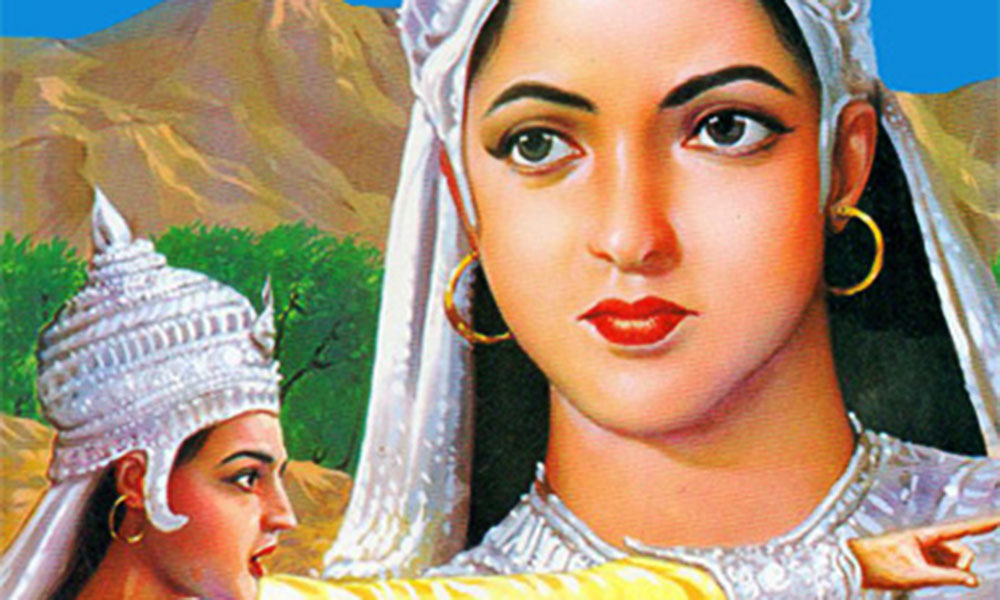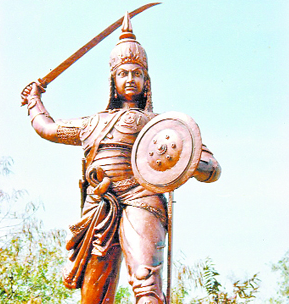हिंदी में पढ़ने के लिए स्क्रॉल डाउन करें
The Will- Chandamama April 1971
Dhanapal was deeply in debt. He had seen this coming as long ago as last summer when he had foolishly borrowed money to start a cloth business, and from the very onset, it had failed.
His life, was a dismal failure, and the sooner it ended, the better. Taking a last look around his poor abode, he made his way through the fields to the river and, without hesitation, flung himself into the swirling waters.
A holy man happened to be walking along the river bank and saw someone drowning; he promptly jumped in and managed to save him.
As soon as he recovered, he confessed to the holy man that his life had been such a failure he had decided to commit suicide.
“My son,” said the holy man. “You should know that it is a sin to take your life. You are a young man and must face the future with confidence.”
“I only wish I had confidence,” Dhanapal stammered. The holy man merely smiled and produced an amulet, which he handed to Dhanapal. “My son always wears this on your right wrist, and I am sure you will find the confidence you lack.”
Years passed, and maybe the amulet possessed some magic power, or perhaps, the holy man’s words gave Dhanapal a new outlook, for he began to prosper, and now he was recognized as one of the wealthiest merchants in the district.
Dhanapal eventually married and had one son. His business interests flourished and became so big that he was forced to engage a manager. He appointed Suresh, a capable businessman who soon proved his efficiency in looking after Dhanapal’s many enterprises.
Then a sad blow descended. His wife died. And before he recovered from the shock, Dhanapal contracted an incurable disease, and he knew that his life would soon come to a close.
Before he died, he sent for the village elders and asked them to make out his will, which he insisted should be worded thus ‘Until my son attains his majority, I appoint my business manager Suresh as his sole guardian, the keeper of all my properties. When my son reaches the age of twenty-one, Suresh will hand over to my son all that Suresh would like to possess for himself. Whatever remains of my estate, I bequeath to Suresh.’
The elders were shocked at the terms of Dhanapal’s will, which placed far too much power in the hands of Suresh. Still, it must be said that after Dhanapal died, Suresh brought the son up well and engaged the best tutors for his education.
When the son reached the age of twenty-one, he went to Suresh and asked. “Now I am of age. I presume you will hand over to me my father’s properties?”
“I am afraid not,” replied Suresh. “You must understand that a considerable sum has been spent on your upkeep and education. All left for you is the amulet your father used to wear.”
The son was astonished at such news. “Do you mean telling me I do not inherit my father’s estates?”
At this, Suresh jumped out of his chair and, going to his desk, pulled out a paper, which he thrust under the son’s nose.
Read your father’s will,” he shouted. “It clearly says that everything is left to my discretion.”.
The son went away astounded that he was to be left destitute, and he was confident that his father never intended that Suresh should grab everything. The only answer, he thought, was to take the matter to court.
Suresh and the youth were summoned two days later to attend the magistrate’s court. Having listened to the youth’s plea, the magistrate asked to see the will, which he seemed to read with considerable interest.
Looking over the top of his glasses, the magistrate said to Suresh. “Am I to take it that you intended to carry out the wishes of your late master, as laid down in his will?”.
“Most certainly,” replied Suresh heatedly. “I have acted strictly by the will.”
“In what way?” asked the magistrate, with a twinkle in his eyes. “I offered his son the amulet that brought his father so much wealth,” Suresh replied, “and decided to keep the rest of the estate for myself.”
The magistrate beamed at Suresh. “So you decided that apart from the talisman, you would like to possess the deceased estates. Is that correct?”
“Yes, that is correct,” replied Suresh, glad the magistrate could see his viewpoint.
“Then,” said the magistrate firmly, “According to the terms of this will, all you would like to possess must be handed over to the son. The only thing you did not want to have was the amulet. So that is all you can inherit.
At first, Suresh could not believe his ears, but then it slowly dawned on him that his late master was a shrewd judge of character.
वसीयत- चंदामामा अप्रैल 1971
धनपाल बहुत कर्ज में डूबा हुआ था। उसने ऐसा काफी समय पहले पिछली गर्मियों में देखा था जब उसने कपड़े का व्यवसाय शुरू करने के लिए मूर्खतापूर्ण तरीके से पैसे उधार लिए थे, और शुरुआत से ही वह असफल हो गया था।
उनका जीवन, एक निराशाजनक विफलता थी, और यह जितनी जल्दी समाप्त हो, उतना बेहतर था। अपने गरीब निवास के चारों ओर अंतिम नज़र डालते हुए, वह खेतों के माध्यम से नदी की ओर चला गया और, बिना किसी हिचकिचाहट के, खुद को उफनते पानी में फेंक दिया।
एक पवित्र व्यक्ति नदी के किनारे टहल रहा था और उसने किसी को डूबते हुए देखा; वह तुरंत कूद गया और उसे बचाने में कामयाब रहा।
जैसे ही वह ठीक हुआ, उसने पवित्र व्यक्ति के सामने कबूल किया कि उसका जीवन इतना असफल रहा था कि उसने आत्महत्या करने का फैसला किया था।
“मेरा बेटा,” पवित्र व्यक्ति ने कहा। “तुम्हें पता होना चाहिए कि तुम्हारी जान लेना पाप है। आप एक युवा व्यक्ति हैं और आपको आत्मविश्वास के साथ भविष्य का सामना करना होगा।”
धनपाल ने हकलाते हुए कहा, "मैं केवल यही चाहता हूं कि मुझमें आत्मविश्वास हो।" पवित्र व्यक्ति केवल मुस्कुराया और एक ताबीज निकाला, जिसे उसने धनपाल को दे दिया। "मेरा बेटा इसे हमेशा तुम्हारी दाहिनी कलाई पर पहनता है, और मुझे यकीन है कि तुममें वह आत्मविश्वास मिलेगा जिसकी कमी है।"
साल बीत गए, और शायद ताबीज में कुछ जादुई शक्ति थी, या शायद, पवित्र व्यक्ति के शब्दों ने धनपाल को एक नया दृष्टिकोण दिया, क्योंकि वह समृद्ध होने लगा, और अब वह जिले के सबसे धनी व्यापारियों में से एक के रूप में पहचाना जाने लगा।
धनपाल ने अंततः शादी कर ली और उनका एक बेटा था। उनके व्यावसायिक हित फले-फूले और इतने बड़े हो गए कि उन्हें एक प्रबंधक नियुक्त करने के लिए मजबूर होना पड़ा। उन्होंने एक सक्षम व्यवसायी सुरेश को नियुक्त किया, जिसने जल्द ही धनपाल के कई उद्यमों की देखभाल में अपनी दक्षता साबित कर दी।
तभी एक दुखद झटका लगा। उनकी पत्नी की मृत्यु हो गई. और सदमे से उबरने से पहले, धनपाल को एक लाइलाज बीमारी हो गई, और वह जानता था कि जल्द ही उसका जीवन समाप्त हो जाएगा।
मरने से पहले, उन्होंने गाँव के बुजुर्गों को बुलाया और उनसे अपनी वसीयत बनाने के लिए कहा, जिसे उन्होंने इस प्रकार लिखा होना चाहिए 'जब तक मेरा बेटा वयस्क नहीं हो जाता, मैं अपने व्यवसाय प्रबंधक सुरेश को उसका एकमात्र अभिभावक, मेरे सभी का रक्षक नियुक्त करता हूँ। गुण। जब मेरा बेटा इक्कीस साल का हो जाएगा, तो सुरेश मेरे बेटे को वह सब कुछ सौंप देगा जो सुरेश अपने लिए रखना चाहेगा। मेरी संपत्ति में से जो कुछ भी बचा है, मैं सुरेश को दे देता हूं।'
धनपाल की वसीयत की शर्तों से बुजुर्ग हैरान थे, जिसने सुरेश के हाथों में बहुत अधिक शक्ति दे दी थी। फिर भी, यह कहा जाना चाहिए कि धनपाल की मृत्यु के बाद, सुरेश ने बेटे को अच्छी तरह से पाला और उसकी शिक्षा के लिए सबसे अच्छे शिक्षकों को नियुक्त किया।
जब बेटा इक्कीस साल का हुआ तो उसने सुरेश के पास जाकर पूछा। “अब मैं वयस्क हो गया हूँ। मुझे लगता है कि आप मेरे पिता की संपत्ति मुझे सौंप देंगे?”
“मुझे डर नहीं है,” सुरेश ने उत्तर दिया। “तुम्हें यह समझना चाहिए कि तुम्हारे पालन-पोषण और शिक्षा पर काफी धनराशि खर्च की गई है। तुम्हारे पास केवल वह ताबीज बचा है जो तुम्हारे पिता पहनते थे।”
ऐसी खबर से बेटा हैरान रह गया. "क्या आप मुझे यह बताना चाहते हैं कि मुझे अपने पिता की संपत्ति विरासत में नहीं मिली है?"
इस पर सुरेश अपनी कुर्सी से उठे और अपनी मेज के पास जाकर एक कागज निकाला, जिसे उन्होंने बेटे की नाक के नीचे दबा दिया।
अपने पिता की वसीयत पढ़ो,'' वह चिल्लाया। "यह स्पष्ट रूप से कहता है कि सब कुछ मेरे विवेक पर छोड़ दिया गया है।"
बेटा आश्चर्यचकित होकर चला गया कि उसे बेसहारा छोड़ दिया जाएगा, और उसे विश्वास था कि उसके पिता का कभी इरादा नहीं था कि सुरेश सब कुछ हड़प ले। उन्होंने सोचा कि एकमात्र उत्तर यह था कि मामले को अदालत में ले जाया जाए।
सुरेश और युवक को दो दिन बाद मजिस्ट्रेट की अदालत में उपस्थित होने के लिए बुलाया गया। युवक की दलील सुनने के बाद, मजिस्ट्रेट ने वसीयत देखने के लिए कहा, जिसे वह काफी दिलचस्पी से पढ़ने लगा।
मजिस्ट्रेट ने अपने चश्मे के ऊपर से देखते हुए सुरेश से कहा। "क्या मैं यह मान सकता हूं कि आप अपने दिवंगत स्वामी की इच्छाओं को पूरा करना चाहते थे, जैसा कि उनकी वसीयत में लिखा गया था?"
“निश्चित रूप से,” सुरेश ने गरम होकर उत्तर दिया। "मैंने इच्छानुसार सख्ती से काम किया है।"
"किस तरह से?" मजिस्ट्रेट ने आँखों में चमक लाते हुए पूछा। सुरेश ने उत्तर दिया, "मैंने उसके बेटे को वह ताबीज भेंट किया जिससे उसके पिता को इतनी संपत्ति मिली," और बाकी संपत्ति अपने पास रखने का फैसला किया।
मजिस्ट्रेट ने सुरेश की ओर देखा। “तो आपने फैसला किया कि तावीज़ के अलावा, आप मृतक की संपत्ति पर कब्ज़ा करना चाहेंगे। क्या वह सही है?"
“हाँ, यह सही है,” सुरेश ने उत्तर दिया, ख़ुशी हुई कि मजिस्ट्रेट उसका दृष्टिकोण समझ सका।
"फिर," मजिस्ट्रेट ने दृढ़ता से कहा, "इस वसीयत की शर्तों के अनुसार, आप जो कुछ भी अपने पास रखना चाहेंगे वह सब बेटे को सौंप दिया जाना चाहिए। एकमात्र चीज़ जो आप नहीं चाहते थे वह ताबीज थी। तो यही वह सब कुछ है जो आपको विरासत में मिल सकता है।
पहले तो, सुरेश को अपने कानों पर विश्वास नहीं हुआ, लेकिन फिर धीरे-धीरे उसे एहसास हुआ कि उसका दिवंगत गुरु चरित्र का एक चतुर न्यायाधीश था।



.jpg)













